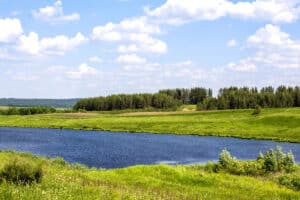Many recreational land buyers want to find a property in an area that is far enough away from home that they can escape to a remote sanctuary. Usually that means driving, at minimum, two or three hours from home. So when a buyer is looking for properties to consider, it’s important to make every fact-finding trip count.
With that in mind, buyers and their real estate brokers need to do their homework. Here are five tips for buyers as they work with a broker to make the first property visit the most productive it can be.
1. Determine how you want to use the property, which will help you determine what features you are looking for.
For example, will you hunt on the property? If so, quality wildlife, water sources and ground cover are important.
Will you be looking at the property as a timber investment? If so, the number, quality and age of the trees will play into your decision.
Do you want complete privacy and plenty of space between you and the neighbors? If so, you will want to look at larger tracts.
And are you looking for investment in land that has future subdivision potential? Some buyers want to have the possibility of subdividing their land at some point in the future.
Once you have answers to these questions, it will help the broker narrow down the options to several specific properties that match your needs in terms of size and features.
2. Decide a range for what you are willing to pay, and be realistic.
Pricing for recreational property in many parts of the country has bottomed out and is actually increasing in some areas. Couple that with the fact that fewer owners are doing “distressed” sales, and we are finding that the spreads between listing prices and sales prices are often narrower now than they were several years ago.
So have a realistic budget in mind: This will prevent you from wasting your time looking for properties that are beyond what you want to spend.
But also know there are ways to think creatively as you look for your dream property. For example, if you can’t afford, say, an entire 600-acre property with the features that fit your wish list, perhaps the seller would be willing to let you buy a piece of it.
3. Use technology to get a feel for the properties you are thinking about visiting.
Using such tools as Google Earth and aerial photos, the broker can help you get a feel for such things as topography, road access and proximity to nearby amenities.
Also, some brokers can use such services as Join.Me.com or GoToMeeting.com to do an online tour of properties with you without you having to leave your house.
4. Think about more than just the geographic features of a property: Also think about how the property will fit into your lifestyle.
We are finding that many recreational land buyers are looking for a recreational property as a place they may want to live full-time someday, or even in the very near future.
If that is the case, it is important to ask such questions as: Is the property suitable for building a house? Could I find part-time work nearby? Is internet access or proximity to electricity an issue? How close are such retailers as grocery stores, home improvement stores and drug stores? What is the climate like? Are there any county restrictions or building permits I need to consider?
5. Research your financing options in advance.
We are finding that a number of banks and lenders are still financing loans on recreational property. Many land brokers have established relationships with several lenders they can recommend to you. Contact a few of these financial institutions before you start shopping so you know what you qualify for.
Some keys to think about in this area: How much are you willing to put down? And what would you like your monthly payments to look like?
Considering everything from financing to your desire for privacy will help you make that first trip efficient for everyone involved. After all, who has time to waste time these days?
– Recreational real estate expert Rick Musick is owner of United Country Musick & Sons Auction and Real Estate Services in Nampa, Idaho, part of the Potlatch Preferred Broker network.
This content may not be used or reproduced in any manner whatsoever, in part or in whole, without written permission of LANDTHINK. Use of this content without permission is a violation of federal copyright law. The articles, posts, comments, opinions and information provided by LANDTHINK are for informational and research purposes only and DOES NOT substitute or coincide with the advice of an attorney, accountant, real estate broker or any other licensed real estate professional. LANDTHINK strongly advises visitors and readers to seek their own professional guidance and advice related to buying, investing in or selling real estate.










Great article Rick. I would add, working with a realtor who specializes in recreational property makes a huge difference too.
What you are saying, in other words, is that recreational property buyers need to consider the exact same things as residential property buyers. They need to approach the potential purchase with the same questions and rational frame of mind as those purchasing a home. Some unique recreational property considerations should be examined. These are apart from what any purchaser of property would consider. Recreational property purchasers need to know about plans for development in the area: is a reservoir in the works over the next 10 years, which will flood the property? Is a new home community planned for just over the ridge, which will result in restrictions on shooting and hunting? What are the annexation plans for the area? Please address the recreation-specific property issues in a future article.
Thanks so much for sharing these five tips on buying land! I really like your first point on determining how you want to use the property. If you really do want to buy some land that is far from where you live, then it is important that you don’t spend every afternoon driving to new properties that you could have ruled out while at home!